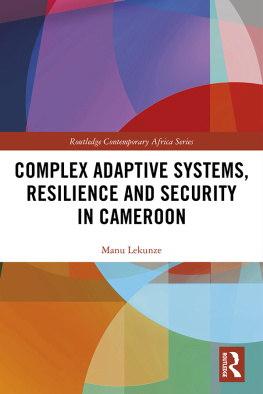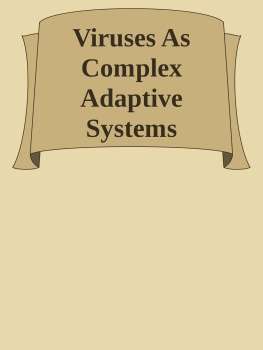
Society A Complex Adaptive System
INTERNATIONAL STUDIES IN GLOBAL CHANGE
Edited by Tom R. Bums, Uppsala University, Sweden
Thomas Dietz, George Mason University, Fairfax, Virginia, USA
This book series is devoted to investigations of human ecology, technology and management and their interrelations. It will include theoretical and methodological contributions to the analysis of social systems and their transformation, technology, risk, environmental problems, energy and natural resources, population growth, public health, and global economic and societal developments.
Volume 1
WOMEN, SEXUALITY AND THE CHANGING SOCIAL ORDER
The Impact of Government Policies on Reproductive Behavior in Kenya
Beth Maina Ahlberg
Volume 2
MANAGING NETWORKS IN INTERNATIONAL BUSINESS
Edited by Mats Forsgren and Jan Johanson
Volume 3
MUNICIPAL ENTREPRENEURSHIP AND ENERGY POLICY
A Five Nation Study of Politics, Innovation and Social Change
Alison E. Woodward, Jerry Ellig and Tom R. Burns
Volume 4
AGENCY AND STRUCTURE
Reorienting Social Theory
Edited by Piotr Sztompka
Volume 5
TAMING THE DRAGON
Transforming Economic Institutions in the Face of Global Change
Carlo C. Jaeger
Volume 6
UNNATURAL SELECTION
Technology, Politics, and Plant Evolution
Cary Fowler
Volume 7
PERSPECTIVES ON NATIONALISM AND WAR
Edited by John L. Comaroff and Paul C. Stern
Volume 8
COMPARING PRISON SYSTEMS
Toward a Comparative and International Penology
Edited by Robert P. Weiss and Nigel South
Volume 9
SOCIETY A COMPLEX ADAPTIVE SYSTEM
Essays in Social Theory
Walter Buckley
This book is part of a series. The publisher will accept continuation orders which may be cancelled at any time and which provide for automatic billing and shipping of each title in the series upon publication. Please write for details.
Society A Complex Adaptive System
Essays in Social Theory
Walter Buckley
University of New Hampshire, Durham
USA
Foreword by Margaret Archer
Gordon and Breach Publishers
Australia Canada China France Germany India Japan Luxembourg Malaysia The Netherlands Russia Singapore Switzerland
Copyright 1998 OPA (Overseas Publishers Association) N.V. Published by license under the Gordon and Breach Publishers imprint.
All rights reserved.
No part of this book may be reproduced or utilized in any form or by any means, electronic or mechanical, including photocopying and recording, or by any information storage or retrieval system, without permission in writing from the publisher. Printed in Canada.
Amsteldijk 166
1st Floor
1079 LH Amsterdam
The Netherlands
appeared previously in Individuality and Social Control: Papers in Honor of Tamotsu Shibutani, Kian M. Kwan, ed. Copyright 1996 JAI Press, Greenwich, Connecticut. All have been slightly updated and are reprinted here with permission.
British Library Cataloguing in Publication Data
Buckley, Walter
Society : a complex adaptive system : essays in social theory. (International studies in global change ; v. 9 ISSN 1055-7180)
1.Social sciences Philosophy
I.Title
300.1
ISBN 90-5700-537-9
CONTENTS
INTRODUCTION TO THE SERIES
This series brings together under one banner works by scholars of many disciplines. All of these researchers have distinguished themselves in their specialties. But here they have ventured beyond the frontiers of traditional disciplines and have developed new, innovative approaches to the study of social systems and social change.
Why? What has prompted this foray into uncharted territory? What is the reason for broadening theoretical perspectives and developing new methodologies? The impetus comes from the world we seek to understand. Scholars have traditionally made boundary assumptions that limited their scope of inquiry to the concerns of a discipline. Such limitations facilitate concentration, though they have always been artificial. The interpenetration of social, economic, and environmental phenomena, and the precipitous pace of change in the late twentieth century make it clear that such convenient intellectual boundaries are not only unrealistic, they are untenable.
How complex waves of change sweep through the contemporary world, altering the natural environment, technology, the economy, and social systems; the interaction of these forces, their impact on nations, communities, families and individuals; and the response to them by individuals and collectivities this is the focus of the research to be presented in this series. The scholars writing in the series are themselves engaged in social change the restructuring of our way of thinking about the world.
There is no better example of such engagement than Walter Buckley, a leading sociologist and social scientist. His book addresses a wide range of issues: theoretical, epistemological, methodological and moral. These are further contributions to what Prof. Margaret Archer refers to in her foreword as the morphogenetic research program Buckley launched in the 1960s. This new book is long overdue and elaborates a number of ideas outlined in earlier work. We are very pleased to have it as part of our series.
Tom R. Burns
Thomas Dietz
FOREWORD
It is welcome to be given the essential Walter Buckley at the end of the century, so that we can acknowledge our debt, recognize the fifty-year struggle involved in producing this corpus, and express the hopes that ride on the development of the morphogenetic research program. If we think that we live in hard theoretical times, a view Buckley shares, his work shows that times are never other than hard in social theory: as we skirt shifting sociological moraine, clamber on the few shoulders that are worth climbing, and remind ourselves not to forget our antics have no aesthetic justification but are an intangible offering towards the illusive humane society.
The debt is straightforward, though cashing it in involves joining Walter Buckley in his struggle. For theory, too, is not a spectacle but a predicament. It consists quite simply in his consistent attempts to destroy the analogical quick-fix; something that does no harm to our analogical imaginations. Society he insists is a system, but that does not make it a mechanical system whose fixed parts have determinate functions reliant upon energy nor an organic system whose pre-set preferred states and dependence on negative homeostatic feedback make them insufficiently isomorphic with society. Instead, modern systems perspective eschews analogizing and suggests that it is a morphogenetic system. Society, in short, is a system like nothing but itself, given its intrinsic and defining ability to change its form or state. This is to emphasize restructuring as a basic feature distinguishing society from an organism or machine (p. 87). If I have one note of regret about this collection it is the non-inclusion of those brilliantly economical four pages from Sociology and Modern Systems Theory (pp. 173-176) where he warns against setting up the simple cybernetic system as the new analogue. For this idealized model thus tends to assume not only a consensual unified control center, but an automatic and unfailing transformation of decisions into final actions (p. 205), which implies a particular, and not universal, centralized decision-making center and a stable central value system reminiscent of the Parsonian one. Instead, the most viable system response may be a change in the very goal parameters themselves (p. 207) often arising through social conflicts and systemic tensions that lie beyond the purview of goal-directed, error-correcting systems.








